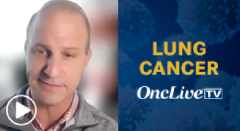
Dr Levy on Multidisciplinary Treatment in Lung Cancer Care

Benjamin Levy, MD, discusses the utility of multidisciplinary treatment in lung cancer care.
Episodes in this series
Benjamin Levy, MD, clinical director, Medical Oncology, Johns Hopkins Sidney Kimmel Cancer Center, Sibley Memorial Hospital; associate professor, oncology, Johns Hopkins University School of Medicine, discusses the utility of multidisciplinary treatment in lung cancer care.
The management of lung cancer has evolved into a highly intricate process, demanding a comprehensive approach, Levy begins. Specifically, when treating patients with locally advanced/stage III disease, the involvement of various disciplines becomes imperative, he explains. Beyond the realm of medical oncologists, health care professionals such as surgeons, radiation oncologists, and pathologists play crucial roles in deciphering tissue intricacies to tailor treatments effectively, Levy states, adding that although feasible in theory, orchestrating a collaborative discussion among these experts proves challenging in practice. However, such collective deliberation is paramount, he notes.
Facilitating the journey of these patients often falls on the shoulders of a dedicated physician advocate, typically found in the ranks of medical or radiation oncologists, Levy expands. Tumor boards emerge as pivotal arenas for dissecting treatment options, especially as the therapeutic armamentarium for stage III and earlier lung cancer undergoes significant expansion, he elucidates. Delving into the nuances of each case, these boards craft optimal management strategies, reinforced by the guidance of a physician, Levy says. Certain communities excel in embracing a multidisciplinary ethos, exhibiting a level of proficiency akin to specialized oncologists, he continues. However, regardless of setting, effective communication remains the linchpin. To bridge the gap between bustling community practices and academically focused institutions, a concerted effort spearheaded by “physician champions” ensures cohesive treatment plans, Levy elucidates.
Overall, tumor boards serve as the nexus for exchanging ideas, fostering collaboration, and promoting alignment among stakeholders, he reports. The diversity of therapeutic avenues for early-stage lung cancer have replaced rigid treatment paradigms, and this shift underscores the indispensability of multidisciplinary discourse, Levy explains. Whether convened physically or virtually, these forums stand as vital platforms for patient-centric decision-making and therapeutic innovation, he concludes.






































